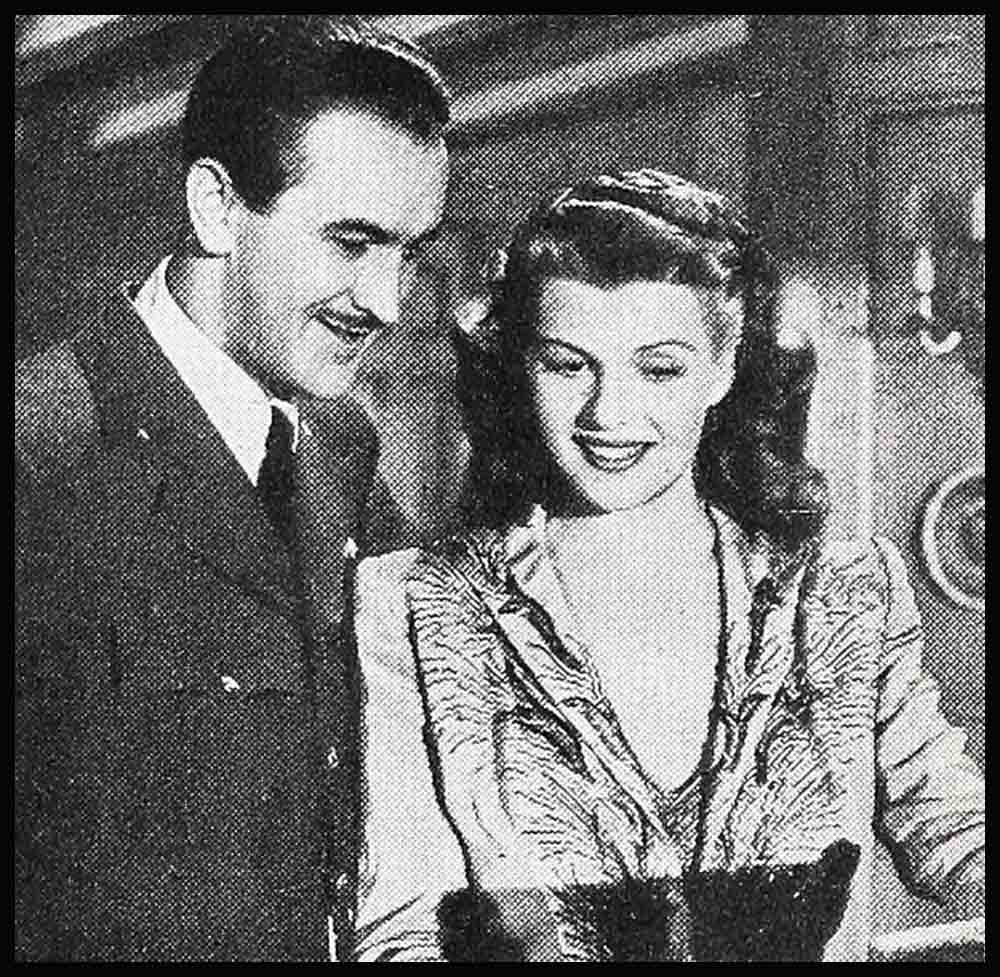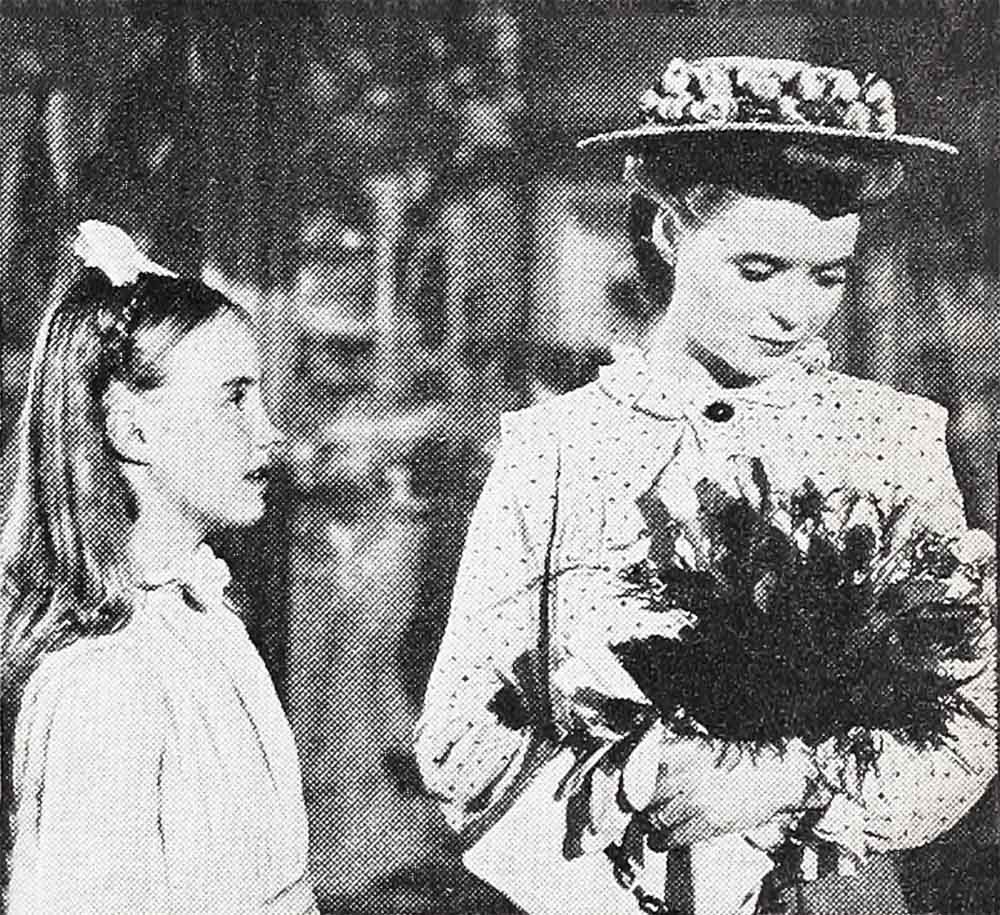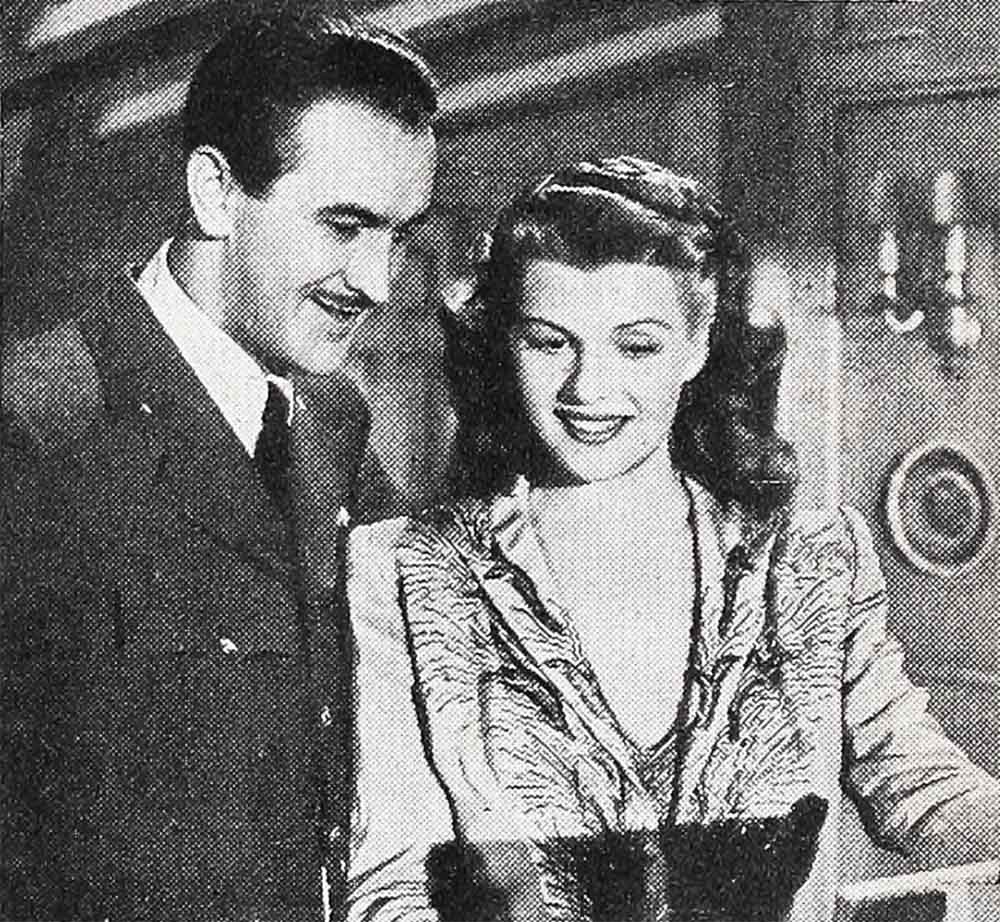
Go Out To A Movie

Tree Grows In Brooklyn (20th Century-Fox)
How a more humanly tender story could be told with its hundreds of little tendrils reaching into the corner of every heart, we can’t imagine. For here is everything—tenderness, pathos, reality, humor and the plain ugliness of plain ugly living with each character living his role, exactly as described by Betty Smith in her novel.
Dorothy McGuire is “Mama,” growing cold and bitter under the strain of poverty and stress. The childbirth scene between Miss McGuire and her daughter is one of the finest ever shown on a screen, to our mind, and how magnificently Peggy Ann Garner as Francie rises to meet it. In fact, we can’t conceive of any other Francie than the plain but deeply intuitive little Garner miss who seems to feel every ache and sorrow of Francie.
Fleeting, heart-gripping scenes keep passing in review as we write. Jimmy Dunn is a magnificent Johnny, a man of weakness and charm who finally withers and dies when responsibility becomes an unconquerable ogre. And Joan Blondell as Aunt Cissy—how right she is in this role of the much-married but seldom-divorced member of the family. Ted Donaldson as Neeley Nolan is more likable than ever and a mighty fine actor at that for a kid. John Alexander as Steve, Cissy’s milkman husband; Lloyd Nolan as the smitten police officer; James Gleason as the saloon keeper, and so many others, offer gems of performances.
Unlike the book, the film ends with the children not yet grown, but this is a commendable rather than objectionable feature, for the picture is already overlong. But despite its length, you’ll find it done as you would have it. And what higher praise could any picture have?
Your Reviewer Says: A gem of Sincerity.

Tonight And Every Night (Columbia)
It’s a musical—different, appealing and B strangely warming in its quaint little way, adorned with Rita Hayworth’s beauty, enhanced with the dancing of an amazing blond young man named Marc Platt and silhouetted against the early bombings of London. Based on the play, “Heart Of A City” by Lesley Storm, which revealed the true story of a London theater that stayed open during the raids with the cast living in the theater, the story occasionally veers off to the unbelievable, but happily skips over these rough spots to be on its way again.
Janet Blair is fair as Rita’s buddy but Lee Bowman as her Royal Air Force beau is handsome and fetching even if his acting capabilities aren’t taxed too seriously.
Glimpsed briefly is Stephen Crane as Bowman’s pal. Remember him as Lana’s ex?
Very good are Florence Bates as May Tolliver who manages the theater, Professor Lamberti as the xylophone comic, Leslie Brooks as Angela, Dusty Anderson as Toni and Ernest Cossart as Sam Royce.
Occasionally the color seems slightly mildewed and the sets haphazard, but on the whole it’s a sightly little show. And oh yes, watch out for the Platt lad.
Your Reviewer Says: Music against the horror of war.

LOUISE RANDALL PIERSON’S widely read autobiography takes on considerable life with Rosalind Russell a perfect Louise and Jack Garson a fabulous Harold. There is charm galore in the episodic story that suffers unnecessarily from the overcrowding of too much material into a picture that is overlong.
The story picks up halfway through with Jack Carson’s entry into the film. The predicaments, the trials and tribulations of this woman and her brood of five somehow always seem comical through her indomitable spirit of optimism.
Her get-up-and-do and her almost pixielike habit of stomping over imaginary rainbows appeal to the risibles and Rosalind has never been better, believe us.
Donald Woods is perfect as the man who endured for ten years but could take it no longer.
The children who progress through various stages of awkward growth are by far the most natural group of screen children seen in ages. They eventually develop into Robert Hutton, Andrea King, John Sheridan, Jean Sullivan and Robert Arthur—and all are splendid.
Carson is magnificent. The screen seems empty during his absences. Ann Doran as Rosalind’s friend is likable. In short, every member of the cast seems exactly chosen, a fact that adds considerably to the authentic charm of the story.
Your Reviewer Says: A delight.
Hangover Square (20th Century-Fox)
Maybe we’re wrong but we enjoy so much these goose-pimply thrillers when well done, we couldn’t resist our best-of-the-month approval for this one so expertly played by our late friend, Laird Cregar. Perhaps it was this, his last performance, that swayed us. Nevertheless we feel this is an outstanding and gripping film due to the superb job of picture craftsmanship, the logical enough reason that revolves the man Cregar into a monster that even he has no memory of, once normalcy returns, and the wonderfully quiet authority of George Sanders as the Scotland Yard psychiatrist. And for good measure, there’s Linda Darnell’s playing of the sex-laden gal whose own antics prove her undoing.
Director John Brahm deserves credit for keeping the tension high as well as high class with few let downs. But it’s Cregar who gives the key performance that unlocks the door to an evening well worth while—providing you like chillers.
Your Reviewer Says: You’ll shiver ‘n’ quiver.
Based on an actual event in the unbelievable horror of jungle warfare in the South Pacific, “Objective Burma” is an exciting story calmly told. The writers and director fortunately had the good sense to let the deed dang its own bell of excitement and bravery while the men who brought it about behave as normal, quiet human beings who have a job to do and do it. There are few flags waved, few patriotic speeches and almost no false heroics. and therein lies the strength of the film. Errol Flynn, too, has been considerably tamed in his single handed war-winning antics. There’s a pleasant quietness about Flynn that amounts almost to a self-effacement in its subordination to story that adds enormously to his stature.
There are so many meritorious performances, it’s difficult to list them all. We especially liked Jim Brown as Sgt. Treacy. It’s by far his best job to date and now surely his studio will do something big for him. William Prince will be remembered a long time as Lt. Jacobs, the history teacher who suffers so horribly at the hands of the Japs. John Alvin, George Tobias, Dick Erdman and others are a part of this group who endure and perform as men and not heroes. Henry Hull as the newspaper conespondent and Warner Anderson as Col. Carter are particularly fine.
We recommend it as one of the best of its kind—the kind we Americans on the home front should see and think about.
Your Reviewer Says: Superb.
Bring on The Girls (Paramount)
Here’s a studio that seems to have lost its touch with musicals—or so it seems to our anxious-to-be-entertained taste at least. And why is this, with all those peoples and songs and sets and everything, including Veronica Lake? For instance, there’s Eddie Bracken and Sonny Tufts with practically all the Navy behind them. And Marjorie Reynolds looking like a dream walking, dancing, singing and just being beautiful in Technicolor. But for all this, it should have been better.
Anyway, Eddie is a comical sort of scion who joins the Navy because all the girls want to marry him for his money. Sonny Tufts goes along as sort of chaperone which is no way to win wars and you know it. Anyhow, Eddie gets mixed up with Veronica, Sonny’s ex-sweetie, until along comes Marjorie Reynolds, also wealthy, but just singing in night clubs for the heck of it. Anyway, it all gets straightened out but we never do, it’s so cornily involved.
We are crazy over a lad called Johnnie Coy who dances like a blue whiz. And is he ka-ute? We liked Spike Jones’s version of “Chloe” too. He’s so nuts with such divine charm. In fact, we liked it all but the corn. Or maybe you’re a vegetarian.
Your Reviewer Says: It’s purty, all right.
What’s got into everybody this month? Comics who have been dull for ages suddenly come to life and Leon Errol, as a harassed man with five chorus girl cuties living in his house, is very funny at times as a share-your-car-driver who suddenly finds himself a share-your-home husband whose wife returns unexpectedly.
Of course Errol really doesn’t know the girls are there until the man who can aid him in securing necessary raw material (all material here is a little raw) wanders in about the time wifie does. So there he is and so are you—stuck with a silly story that grows fairly comical as time progresses.
Your Reviewer Says: Don’t be so fussy.
It was inevitable and properly fitting that I the LTA, Lighter-Than-Air service, should come in for its share of glory in this man’s war and so we are told at last the part played by blimps in sinking submarines, rescuing wrecked planes and crews and performing other vital duties.
The story that surrounds the activities of this little-known branch of the service is heavier than lead, however, and relates the experiences of a hard-boiled but imaginative veteran of LTA, Wally Beery, assigned to training young recruits in this war. His bragging of a mythical wife and son are brought into reality when his fondness for young Tom Drake, a cripple, leads him to exploit him as his own boy. A successful operation results in Drake joining the LTA, becoming an officer, falling in love, winning a somewhat unmerited reward but eventually coming through in a thrilling cloud-hopping climax.
Jan Clayton is pretty as the girl, James Gleason excellent as Beery’s skeptical pal and, incidentally, this is one step forward for that personable young actor, Tom Drake.
Your Reviewer Says: Information in a pleasurable capsule.
Pan-Americana (RKO)
Here we go below the border again, so involved m love and molasses it’s like pulling one’s foot from wet cement. But it’s fun, too, with Audrey Long pretending to be in love with Philip Terry so, as she explains it, she won’t have to wrestle all the way to South America where her real fiance, Marc Cramer, is waiting.
Phillip, a photographer, Audrey and Eve Arden are off on a tour of the South American Republics for the purpose of doing a magazine feature on “our good neighbors,” bless their patient souls, and it’s on this trip that all the bending of Cupid’s arrows takes place.
The Shadow Stage
Robert Benchley, foreign editor of the magazine promoting the trip (hey boss, why don’t we promote something like this?), is amusing, and as always that Arden gal kills us. Terry is a darned good actor, too. Ernest Truex, as the real fiance’s uncle, is a miniature lambie-pie we could see more often—and Ramsay Ames is one we certainly do see more of than usual in every film it seems.
Anyway it’s a cute little daisy-petal business of I love him—I love him not, and what’s more you’ll maybe enjoy it all.
Your Reviewer Says: Now wait, whom do I love?
That Joan Davis! What a woman! What a comic! Even in a picture that has more corn than a field in Iowa she throws us (and everybody around us, let it be said) into a hand-crocheted tizzy. She has ample aid, of course, in the persons of William Gargan and Leon (old buckle knees) Errol, who pitch the ball for Joan to catch, and even the fouls are funny at times.
The story (story—what are we saying?) has Joan hired to run down a murderer who has been plying his trade among the town’s leading citizens. Joan is chosen for the deetectatif role because her ma was chief of police of old Horse Trot, Nevada, which is a silly recommendation for anyone.
Anyway, who cares really why, when or where—with these three dishing it out to us who are willing to take it?
Your Reviewer Says: Well, we laughed.
Don’t tell us this is an attempt to duplicate “The Uninvited” (a really swell mystery). In the first place, the whole idea is garbled in the story construction and the direction doesn’t clear things up materially.
Joel McCrea, who needs a good story and fast, does his best but we simply couldn’t make him out. Gail Russell crowds mystery, fear, love and what-not into her few brief hours in the McCrea manse that, incidentally, houses two of the weirdest children ever seen on the screen.
Phyllis Brooks’s entry into the affair was never explained. Whence cameth the little Brooksie, we ask politely.
Or maybe we’re dreaming up more mysteries than the story started out with in the first place.
Your Reviewer Says: The “Unseen” the better.
Her Lucky Night (Universal)
You see this and it won’t be the luckiest night you ever spent parked in front of the flicker screen.
The Andrews Sisters (and why must they photograph them all to look like Lincoln?) twitch and itch, laugh and scratch, sing and croon. The only departments in which they’re good is the singing and crooning. There they shine.
Martha O’Driscoll and Noah Beery Jr. (in a come-apart dress suit) get caught up in a story that tells something about a fortuneteller, with George Barbier testing the ability of his nephew Noah Beery Jr. for a job. We never rightly could make out what was going on.
Your Reviewer Says: We don’t use such language!
Tain’t funny, McGee, and the harder it tries the worse it gets. The story must certainly have been dropped on its continuity at birth and the actors—well the pity is they really don’t seem to realize how silly it all is or else they’d have slunk off the screen along about the fourth reel.
Arthur Lake is the meeky-mouse pianist who pretends to be a wrestling sensation, and Dale Evans, singing away like mad, is the supposed victim of this unfunny deception. Lionel Stander, George Meeker, Paul Hurst and Marjorie Manners go round for a couple of whirls.
Your Reviewer Says: They didn’t accentuate the positive.
RICHARD ARLEN, a disgraced Union officer (here’s that Civil War again, Mama), goes west to settle with his old boyhood pal, Robert Livingston, dance-hall-saloon proprietor and horner-in on other people’s mines. But Arlen doesn’t take to such shenanigans and goes over to help the miners fight for their rights.
Bobby Driscoll is swell as Arlen’s kid brother. Jane Frazee who sings and Lynne Roberts who teaches Sunday school, “Gabby” Hayes, Russell Simpson and J. M. Kerrigan, round out a story that needs more than rounding out, believe us.
Your Reviewer Says: The big what?
Here Come The Co-eds (Universal)
Abbott and Costello finally have a film worth sitting through and even if it isn’t the funniest thing alive, it’s still amusing in spots—which is the way we prefer our spots.
The boys find themselves caretakers at a girls’ school under the strict supervision of Lon Chaney, made up as Lon Chaney for a change. And then to complicate their lives even more, Lon’s sister, Martha O’Driscoll, a night-club show girl, wins a scholarship to the school; Donald Cook, the headmaster, falls in love with her; Charles Dingle, chairman of the college board of trustees, threatens to close down the joint—pardon—school; Lou gets mixed up with a raw oyster and it all ends up in a mad basketball game that’s a riot.
Phil Spitalny’s all-girl orchestra is a great big beautiful feature of the film that will please their millions of radio listeners. And peppy, happy Peggy Ryan is still another worthwhile feature.
Nothing, believe us, gives us more pleasure than to announce this pair of comics is back in their stride and the laughs are on the house.
Your Reviewer Says: Try to keep a straight face.
Our idea of having a wonderful crime would be to knock that silly, so-gay, charming, aren’t-we-the-ones attitude out of the whole business, despite the fact we love George Murphy madly and feel Pat O’Brien good enough to know better.
George and Carole Landis as newlyweds are so devoted to dear Pat they take him along on their honeymoon. First the little pixie trio visits a theater and what happens but a magician disappears and the three get all mixed up in it and later even get involved in murder.
People come and go and nobody ever does find out what is going on. Certainly we didn’t but maybe you’re smarter.
Your Reviewer Says: Knee-deep in hooey.
It is a quote. PHOTOPLAY MAGAZINE APRIL 1945




